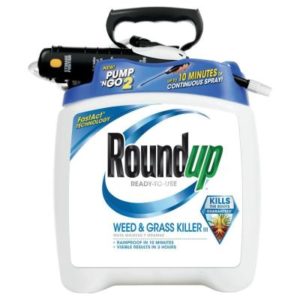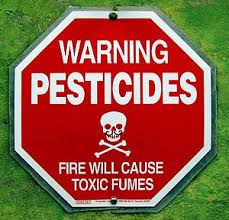 People don't realize the incredibly large amounts of pesticides applied to crops and soil in the US each year. Hundreds of millions of pounds! Which is the reason pesticides are found in our air, rain, water, soil, our foods, and in our bodies.
People don't realize the incredibly large amounts of pesticides applied to crops and soil in the US each year. Hundreds of millions of pounds! Which is the reason pesticides are found in our air, rain, water, soil, our foods, and in our bodies.
One of the pesticides that scientists are getting increasingly concerned with is the weed-killer glyphosate. It is the most used herbicide (weed-killer) in the world! It is found in Roundup, in non-organic crops, and even in genetically modified crops that are glyphosate resistant. Especially used on corn and soybeans, but also in a variety of crops (e.g., wheat, oats, cranberries, grapes, apples, beans).
The following story lays out the great amounts used in some states, especially in the midwest and southern states. Overall, an average of almost 130 pounds of glyphosate were sprayed per square mile in US counties each year.
But some counties had incredibly high amounts, such as Nueces County, Texas which has the highest use of glyphosate: more than 1,100 pounds sprayed per square mile. Iowa and Illinois (corn and soybean crops) accounted for 15% of national usage. The least was in northeastern (e.g., Massachusetts) and southwestern states (e.g., Nevada).
Evidence for health harms are increasing each year, such as an increased risk of cancer (e.g., non-Hodgkin lymphoma), premature births, endocrine disruption, and even disruptions of the gut microbiome (it kills beneficial microbes in the gut). The percentage of people with glyphosate detected in their urine, and the amount (concentration) has been rising over time. It can now be detected in almost all of us.
By the way, the EPA has raised "allowable limits" of glyphosate in foods over the years - when the pesticide industry asked for it. The US limits are much higher than those allowed in Europe - twice the levels! (Once again, in the US the EPA favors industry, not the people it's supposed to be protecting.)
This article is from October 2022, but it highlights the incredibly high amounts of glyphosate applied in the US (see the good interactive map). Excerpts from NBC News: A potentially cancer-causing chemical is sprayed on much of America’s farmland. Here is where it is used the most.
Every day, farms across the country use a potentially cancer-causing chemical that is in the world’s most common weedkillers. And data shows that it’s most used in the Midwest and parts of the South. ...continue reading "Enormous Amounts of One Pesticide Used In the US"

 Once again a study looked at pesticide exposure in humans and found health problems. This time
Once again a study looked at pesticide exposure in humans and found health problems. This time  Millions of pounds of pesticides are used each year in the US for all sorts of reasons - crops, lawns, inside homes, aerial spraying, etc. But what many people don't realize is that the pesticides get into us and they have harmful effects on us. Pesticides can be absorbed through the skin, ingested (from food and water), or inhaled.
Millions of pounds of pesticides are used each year in the US for all sorts of reasons - crops, lawns, inside homes, aerial spraying, etc. But what many people don't realize is that the pesticides get into us and they have harmful effects on us. Pesticides can be absorbed through the skin, ingested (from food and water), or inhaled. Pesticides causing health problems are appearing in study after study. A
Pesticides causing health problems are appearing in study after study. A  This is rarely mentioned, but there is research showing that commonly used chemicals that we are exposed to, such as bisphenols (BPA, BPS), phthalates, persistent organic pollutants (e.g.flame retardants, nonstick cookware), heavy metals (e.g. lead), and some pesticides (e.g.chlorpyrifos, glyphosate), all have an impact on the gut microbiome in animals and humans.
This is rarely mentioned, but there is research showing that commonly used chemicals that we are exposed to, such as bisphenols (BPA, BPS), phthalates, persistent organic pollutants (e.g.flame retardants, nonstick cookware), heavy metals (e.g. lead), and some pesticides (e.g.chlorpyrifos, glyphosate), all have an impact on the gut microbiome in animals and humans.